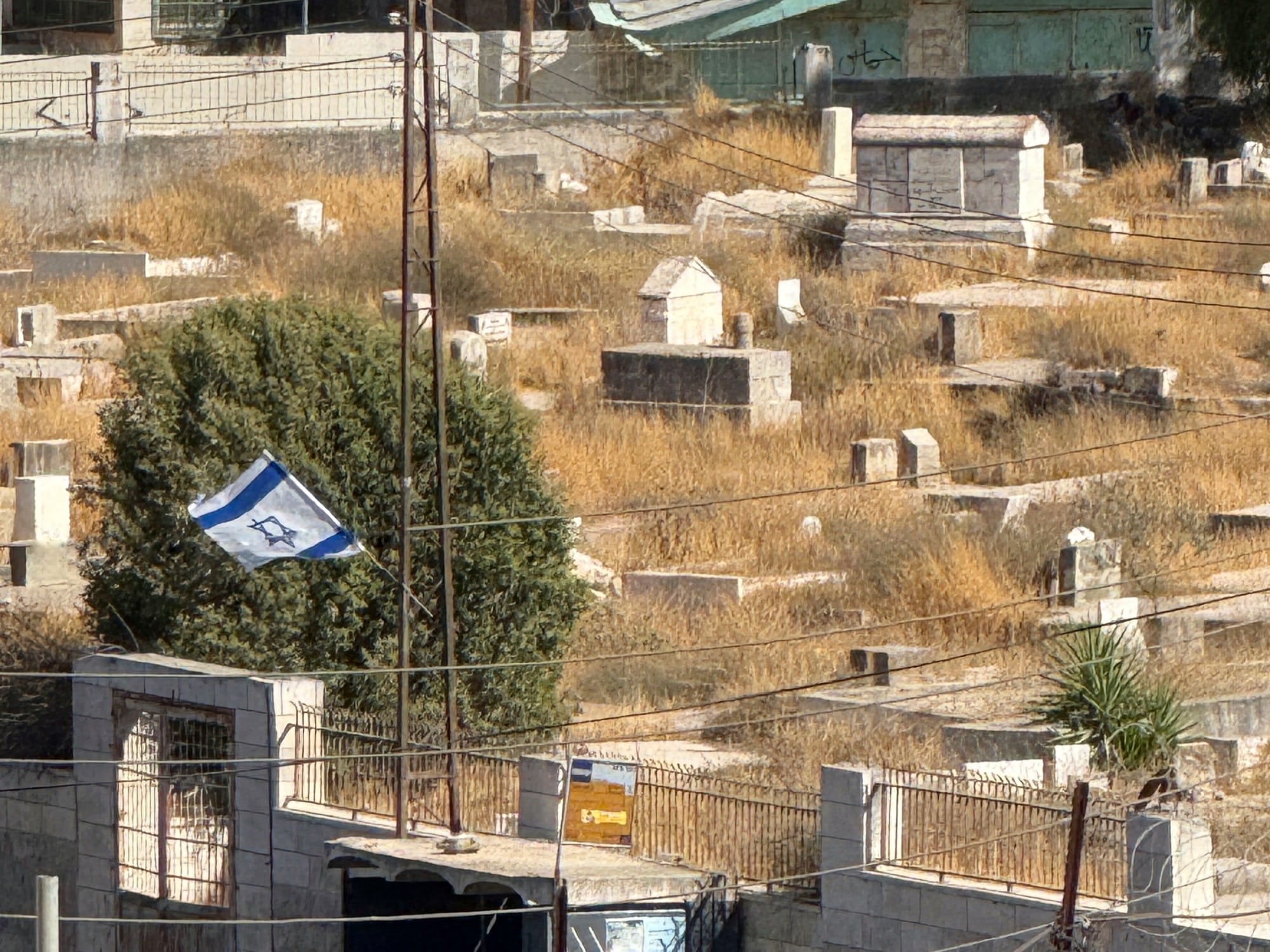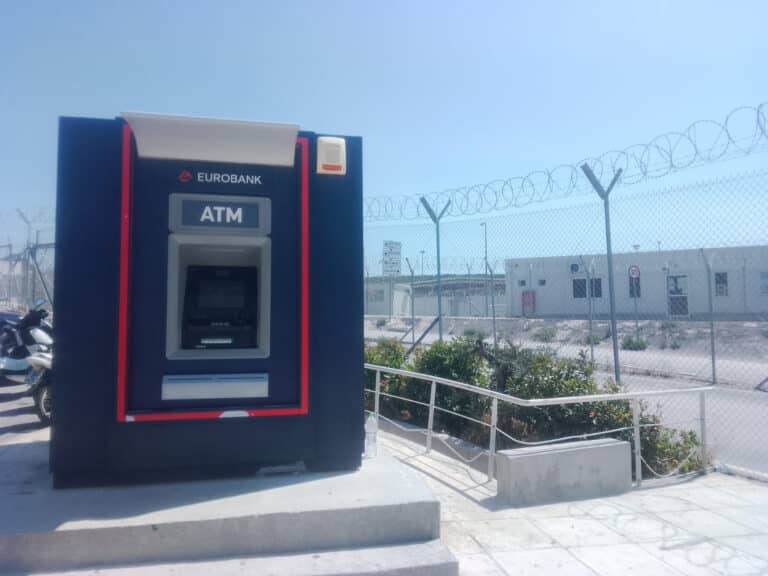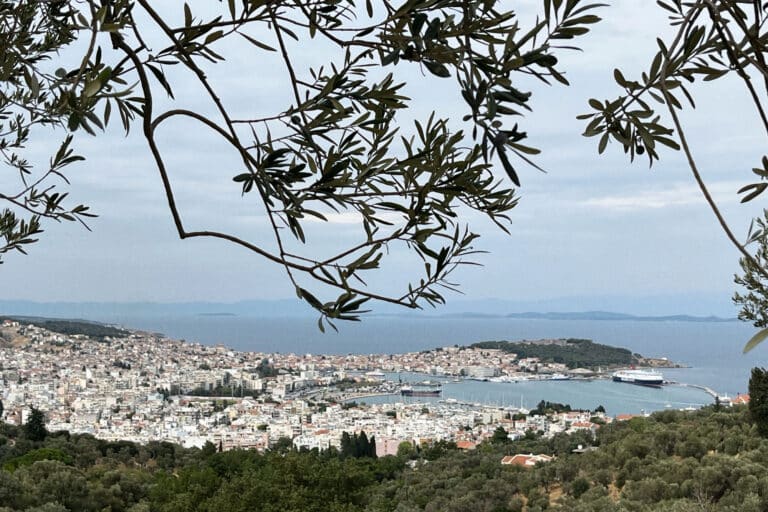In most parts of the world, visiting a grave is a simple, deeply human act. People walk to the cemetery, bring flowers, sit by the tombstone, and whisper their grief and prayers to those who have passed on. For families in Hebron, however, this act of remembrance has become yet another obstacle in daily life under Israeli occupation. What should be a private, sacred moment of mourning is now conditioned by military orders, permits, concrete barriers, and a bureaucratic process that strips dignity from the most basic of human rituals.
A cemetery behind checkpoints: Hebron families denied the right to grieve
The cemetery in Hebron/Al-Khalil once stood as a place of peace, where generations of families laid their loved ones to rest. Today, one of its main entrances is blocked by massive concrete slabs, rendering it inaccessible except through special permits and prior coordination with Israeli authorities by the Palestinian Authority liaison.
The rules are strict: no one can enter the cemetery freely. A family that wishes to bury a loved one must first submit the deceased’s information – full name, ID number, and personal details – to the Palestinian Authority liaison, which then forwards the request to the Israeli liaison. Only if Israeli authorities grant approval can the burial proceed. Even then, the process is riddled with delays, adding anguish to grief.
In death, as in life, Hebron’s residents face the suffocating grip of occupation. The impact is not limited to funerals. Visiting the grave of a parent, a child, or a grandparent requires coordination.
Ahmed, from Hebron, once dreamed of his grandmother and told his mother he wanted to visit her grave. His family bought flowers, as countless families worldwide do when visiting loved ones, and walked to the cemetery.
What awaited them was not silence and remembrance but a locked gate. Palestinian residents explained to Ahmed and his mother that, without prior arrangements, they could not enter. A neighbor suggested that Ahmed stand outside the gate, recite the Fatiha, and greet his grandmother from afar. Ahmed did so, but his hands clutched the flowers tightly as tears filled his eyes. He could not understand why he was forbidden from seeing where his grandmother was buried.
For Ahmed, grief was not only about loss but also about exclusion, rejection, and a confusing message: that his love for his grandmother was subject to military approval.
Before the Second Intifada and the closure of Shuhada Street, which was once Hebron’s bustling central artery, the cemetery was within easy reach. Families could walk there in minutes. During the Second Intifada there were sweeping closures, checkpoints, and segregated streets, designed to protect Israeli settlers who had moved into the heart of the city.
Today, reaching the cemetery is a lengthy and exhausting process. In many cases, it involves long detours that turn a short road into an hours-long ordeal. The simple act of visiting the grave of a loved one has been transformed into a demonstration of patience and endurance under the Occupation.
The denial of access to cemeteries is part of a broader policy of fragmentation in Hebron. Roads are closed, neighborhoods are divided, and Palestinian residents are hemmed in by walls and soldiers. Life itself is regulated; death offers no release.
Collective punishment beyond the grave
The prohibition on free access to cemeteries fits a wider pattern of collective punishment that Palestinian residents of Hebron endure daily. By requiring permits and coordination, Israel does not merely control movement; it controls memory, mourning, and tradition.
The right to mourn is recognized under international human rights and humanitarian law. Denying families the opportunity to bury and visit their dead in dignity constitutes a violation of these rights. It is also a profound affront to cultural and religious practices. In Islam, as in many traditions, visiting graves is an act of respect, remembrance, and connection, a practice that affirms the bond between the living and the dead.
Blocking this practice sends a clear message: even the dead are not free from the reach of occupation.
Residents of Hebron recount painful stories of being denied access to the cemetery. One family, after losing an elderly relative, had to wait hours for Israeli approval before they were allowed to bury their loved one. Another woman described how she could only stand at a distance from her father’s grave on the anniversary of his death because she needed permission to reach it.
For many families, these denials create lasting wounds. Grief is delayed, distorted, or silenced. Instead of private mourning, families find themselves caught in a system of permissions and prohibitions that intrudes even on their most intimate moments.
The cemetery issue cannot be separated from the broader reality of Hebron. Once, Shuhada Street was the lifeline of the Old City, full of shops, schools, and families. Since the 1990s, it has been progressively closed to Palestinians, with large sections completely inaccessible.
This closure has isolated Palestinian neighborhoods and left residents surrounded by military checkpoints and settler enclaves. The cemetery, located near these areas, has become yet another site subjected to the logic of segregation. To protect a few hundred settlers, tens of thousands of Palestinians are denied basic freedoms, including the freedom to mourn.
At its core, the denial of cemetery access is not only a political or territorial issue but a deeply human one. It strikes at the heart of what it means to hold traditions, and to be part of a community, or a family.
International law is clear: occupying powers must respect the rights of the civilian population, including cultural and religious practices. Yet in Hebron, these rights are routinely violated. The control over cemeteries is another tool in a system designed to break the social fabric of Palestinian life and remind residents that nothing, not even death, is outside the reach of occupation.
Despite the barriers, families in Hebron continue to find ways to honor their dead. They recite prayers from behind gates, carry flowers to closed entrances, and keep alive the memory of their loved ones in homes and hearts. In doing so, they transform mourning into an act of resistance.
Denying people the right to grieve freely is an attempt to sever the ties that bind communities together across generations. But as Ahmed’s story shows, even longing to see his grandmother’s grave can resist that severance. Behind every blocked gate and every denied permit lies an unbroken determination: to remember, to love, and to mourn, even in the shadow of occupation.




